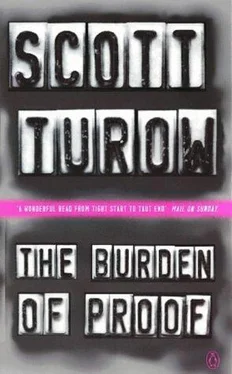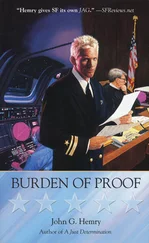Scott Turow - The Burden of Proof
Здесь есть возможность читать онлайн «Scott Turow - The Burden of Proof» весь текст электронной книги совершенно бесплатно (целиком полную версию без сокращений). В некоторых случаях можно слушать аудио, скачать через торрент в формате fb2 и присутствует краткое содержание. Жанр: Детектив, на английском языке. Описание произведения, (предисловие) а так же отзывы посетителей доступны на портале библиотеки ЛибКат.
- Название:The Burden of Proof
- Автор:
- Жанр:
- Год:неизвестен
- ISBN:нет данных
- Рейтинг книги:3 / 5. Голосов: 1
-
Избранное:Добавить в избранное
- Отзывы:
-
Ваша оценка:
- 60
- 1
- 2
- 3
- 4
- 5
The Burden of Proof: краткое содержание, описание и аннотация
Предлагаем к чтению аннотацию, описание, краткое содержание или предисловие (зависит от того, что написал сам автор книги «The Burden of Proof»). Если вы не нашли необходимую информацию о книге — напишите в комментариях, мы постараемся отыскать её.
The Burden of Proof — читать онлайн бесплатно полную книгу (весь текст) целиком
Ниже представлен текст книги, разбитый по страницам. Система сохранения места последней прочитанной страницы, позволяет с удобством читать онлайн бесплатно книгу «The Burden of Proof», без необходимости каждый раз заново искать на чём Вы остановились. Поставьте закладку, и сможете в любой момент перейти на страницу, на которой закончили чтение.
Интервал:
Закладка:
"Explain, please."
"You understand this, Stern. Take pork bellies. One car of bellies-one contract-is 40,000 pounds. I get a customer who wants fifteen hundred cars, that's a whole lot of bacon. The price is gonna take off like a rocket. It's supply and demand. You know, we try every gimmick known to man to slow things down. We lay off trades to friendly brokers. We buy the cash commodity and sell the future. But you can't stop it completely. It's like changing nature."
"Ah-ha," said Stern. So they did know something. The government was investigating large trades, trades which MD handled, trades which Dixon knew about, trades which, when placed, had had a significant impact on prices. "And is there nothing else which occurs to you?"
Dixon shook his head gravely. Nope, nothing, he didn't know a thing.
Stern laid his thick finger again across his lips.
Even with this news, it remained difficult to assay the government's suspicions. The records called for could relate to a number of schemes, particularly on the futures exchanges where knavery of all kinds was rife. Were Stern to guess, his estimate would be that Ms. Klonsky and her colleagues suspected market manipulation of some kind.
There were all manner of baroque ploys. A month or two ago, the papers had been full of stories about a foreign government with a failing sugar crop which had tried to force down the world sugar-futures price so the government could buy and fulfill upcoming delivery commitments more cheaply. They had circulated authoritative rumors that something tailed 'left-handed sugar,' a no-calorie form of natural sugar, had been perfected. For three days prices plummeted, then the futures commissions merchants across the country had discerned what was occurring and bid prices out of sight. Dixon, perhaps, had found some less obvious-but equally illegal-way to tamper with the markets' responses to these huge transactions he handled for his customers.
Dixon, however, continued to point up signs that he was in the clear.
"That subpoena doesn't even mention my name," he said.
"That has to be good, doesn't it?"
The absence was superficially encouraging. But there would have been little reason for the agents to be so obvious in their pursuit of Dixon last week-or to have gone out of town with their initial subpoenas-unless they believed he would quickly recognize the meaning of these inquiries. His client, Stern decided, was keeping things to himself-not unprecedented in these circumstances, and, Lord knew, the general course with Dixon. Today, however, was probably not the time to press, On his feet again, Stern, as he often did, took a moment to stare from his window in Morgan Towers, the city's tallest building, down to the Kindle River, whose swift waters ran here, through various tributaries, into the Mississippi.
With its shining, silvery face, the Kindle had been first named La Chandelle, the candle, by the French trader JeanBaptiste DuSable, who had tarried here on his way from New Orleans to what eventually became Chicago. DuSable's trading post, named after him, was now by far the largest part of a consolidated tri-city municipality of almost a million. Just south, where the river branched and rejoined, two other towns, Moreland, settled by the English, who had Anglicized the river's name, and Kewahnee, once an Indian encampment, had grown up from barge ports and had been merged into DuSable in the mid-1930s. In this era of urban sprawl, the entire area, including the tri-cities, was usually referred to by the name of the surrounding county-Kindle-a hodgepodge megalopolis of city and suburb, prosperity and blight, home in total to almost three million people. The willingness of locals to see their city known by the county name had probably not been dampened by the rediscovery during the 1960s that DuSable, traditionally referred to as the first white man in these parts, had been black.
Dixon was speaking behind him. He wanted to know if they were obliged to turn over all the records the government required. Most of the trades, given their size, had been executed in Chicago, and the search for documents would occupy days for Margy Allison, Dixon's executive vice president, who ran the Chicago office, three hundred miles from here.
"I see no choice," said Stern. "I shall complain to the prosecutor bitterly about the burdens of production. Tell her your business will be brought to a standstill. And I must have some time to look at the records, to see if I can make out what the government suspects. But eventually we must produce. We cannot challenge the subpoena as overbroad -it is quite precise."
"Whatever happened to the Fifth Amendment?" That was Dixon for you, cavalier where. other executives would.stammer before the words could come from their mouths.
Stern explained that the subpoena sought records which belonged in law to the corporation rather than to Dixon himself. The corporation, not an individual, had no Fifth Amendment rights. Dixon could refuse to testify about the records; but the papers themselves would have to be handed over, Claudia buzzed. She had lOonsky. Dixon, in the meanwhile, chewed on his cigar and puzzled over the mysterious logic of the law.
"Ms. loonsky," he said.
"Mr. Stern," she answered. A clear, self-assured voice.
They had never met, but Stern had seen her in the courtroom when she approached the podium for status calls. She was in her late thirties, Stern thought, a robust-appearing woman with broad shoulders, dark hair, strong hands. In court, she had emitted the forbidding persona familiar to many assistants, including a number of the women; eager to prove themselves as tough as their male counterparts, they often came across as humorless and driven, citizens of the late century who saw bmtaiity as a necessary mode in female style. It was largely a pose, but under the circumstances, Stern saw little reason to be refn, ing.
"Two of your storm troopers arrived at my home a few days ago with a subpoena for my client Dixon Harmell."
An instant passed without sound. Storm troopers. Stern himself was surprised by the ruffian edge in his voice. Ordinarily, he prided himself on his civility. In the mehnfime, Dixon, across the desk, was beaming. He had rarely been exposed to Stern when he was so pointed.
"Perhaps I need to explain the circumstances," Stern said.
"I understand the circumstances," Ms. lOonsky shot back.
She was bristling already.
No doubt, everyone understood the circumstances, Stern thought. He had many friends in the prosecufmg offices, both the Kindle County Prosecutor's and the United States Attorney's Office, but they were adversaries, too-and human. It was delicious gossip. Did you hear?
About Stern's wife? Here again, as he contemplated this, the world seemed to open, and the force of painful emotion rushed up at him out of his own breast. How, how was it possible? It was such an unreasoning mess. He closed his eyes, which were burning, and he could sense Dixon stirring. It was a sad comment that his shame, more than anything else, brought on these moments, and that the same pride carded him throughmsome forward-straggling thing impelled him to go on with dignity. Where, damn it, was his cigar? When he spoke, there was no tremor in his voice.
'If you understood, I must say I find your conduct deplorable. Perhaps I should speak to Mr. Sennett." Stan Sennett, a career prosecutor, had been U.S. Attorney for two or three years now. He was the toughest and most humorless of all, and far from an ally of Stern's. Sennett was unlikely to become exercisedwthe agents, after all, were just doing their jobswbut Klonsky could not say that.
"Look, Mr. Stern, this was an honest mistake. It might even be," she said, "that if you gave me half a chance, I would have apologized. I've been calling you for days now."
Читать дальшеИнтервал:
Закладка:
Похожие книги на «The Burden of Proof»
Представляем Вашему вниманию похожие книги на «The Burden of Proof» списком для выбора. Мы отобрали схожую по названию и смыслу литературу в надежде предоставить читателям больше вариантов отыскать новые, интересные, ещё непрочитанные произведения.
Обсуждение, отзывы о книге «The Burden of Proof» и просто собственные мнения читателей. Оставьте ваши комментарии, напишите, что Вы думаете о произведении, его смысле или главных героях. Укажите что конкретно понравилось, а что нет, и почему Вы так считаете.












